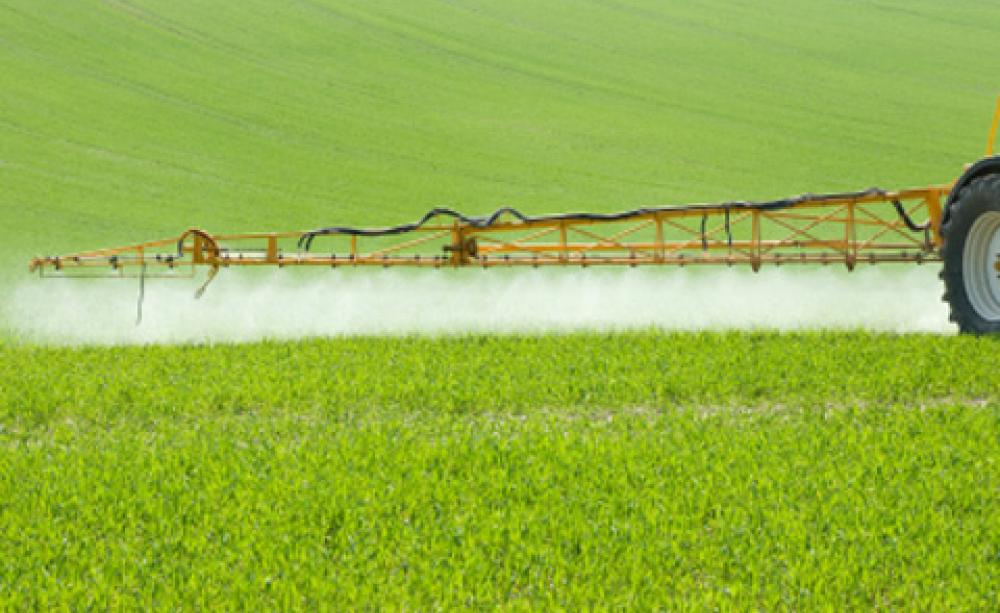The UK Government has come under sustained pressure - through a high profile campaign, the UK courts and the EU legislative system - to toughen up its pesticides legislation over the past decade.
But throughout, both the previous Labour administration and current Coalition Government have stood firm and sought to maintain the status quo. The justification is twofold. Ministers and their advisers have maintained that the UK’s mix of statutory and voluntary pesticide controls are ahead of the game and already provide sufficient protection for the general public and the environment.
They have also become increasingly vociferous in warning of the impact of cutting back on pesticide usage on crop yields at a time of heightened concern about food security. 'Defra’s pesticide policy aims to minimise risk without losing the benefits,' is how the relevant Department neatly sums up its position on its website.
The UK’s approach is best illustrated by its response to a huge chunk of EU legislation that has been grinding its way through Brussels since 2006. The backdrop was growing concern among member states about the potential risks for human health and the environment associated with crop spraying. In 2007, for example, French president Nicolas Sarkozy pledged, as part of a ‘green revolution’, to dramatically cut back pesticide use in France, including banning 47 pesticide products. In 2009, the EU published four pieces of legislation under the banner of the Thematic Strategy for Pesticides.
One strand, the Sustainable Use Directive, sought to harmonise the various regimes governing pesticide usage in place across the EU, covering areas like training pesticide users, inspection of spraying equipment, aerial spraying and protecting waterways, public spaces and conservation areas. Following public consultation in 2010, the UK is about to implement the Directive. Defra recently revealed that, in line with the Government’s commitment to avoid unnecessary regulation, only ‘a small number of changes’ will be made to the UK’s existing arrangements.
It points out that, unlike most EU member states, the UK has had an ‘extensive domestic regime’ in place since the 1980s. This is implemented through a mix of statutory controls and the Voluntary Initiative, an industry-led programme set up 10 years ago to minimise the environmental impacts from pesticide use in order to stave off a pesticides tax. 'Our long-standing and rigorous regulatory regime means we have safety and environmental standards that are among the highest in Europe. Our regime already covers most of the areas set out in the Sustainable Use Directive, and in some areas (notably a requirement for pesticide users to hold a certificate of competence) goes even further,' a Defra spokesman said.
A far more contentious strand of the EU legislative package is the Plant Protection Products Regulation, which came into force in the UK in June 2011. It establishes a new pesticide authorisation system based on ‘hazard’ rather than ‘risk’ with new cut-off criteria designed to exclude the most hazardous compounds.
Explaining the UK’s opposition to the change at a recent conference, David Barnes, the Scottish Government’s Deputy Director of Agriculture, said the risk based system enabled policymakers ‘put rules around’ potentially dangerous products to ensure they can be used safely. 'The hazard based approach means if there is any danger attached to a product at all we simply say it’s not acceptable and can never be used under any circumstance. That is just too inflexible,' he said.
Gordon Brown leads fight against EU rules
The UK Government, with intervention by Prime Minister Gordon Brown at one point, often appeared to be a lone voice as it vehemently opposed the proposals as they were bring debated. Based on impact assessments by Defra’s Pesticides Safety Directorate, it argued that the potential removal of the triazole group of pesticides as ‘endocrine disruptors’ (chemicals with potential adverse effects on human hormone systems) could result in a 20 per cent drop in UK wheat yields.
Even though it is now in place, the finer details of the Regulation are still being pored over by the European Commission and individual member states. According to Dominic Dyer, chief executive of the Crop Protection Association (CPA), the UK’s resistance and changing priorities in Europe mean it is now being interpreted ‘on a more ‘rational basis’.
It is now increasingly likely, he believes, that key chemicals that fall into the hazard criteria will be retained under a derogation that allows temporary approvals where no alternatives are available. 'In 2008, the UK was quite isolated. Since then its position has resonated with other member states,' Mr Dyer said. 'We are in a different world now. No-one among the major players in Europe wants to lose large numbers of very important chemicals like triazoles because they now understand that a 15 -20 per cent reduction in food production in Europe would be disastrous.'
He described a recent EU Parliament vote against calls to ban neonicotinoid pesticides because of their impact on bee health as a further ‘sign of changing times’.
Georgina Downs and the UK pesticides battle
Meanwhile, at home, the Government and farming and pesticides industries have been battling Georgina Downs’ award-winning UK Pesticides Campaign. Ms Downs’ high-profile 10-year campaign maintains that the UK’s ‘short-term bystander’ model of assessing the risks to public health from crop spraying ignores the long-term exposure of residents and is therefore ‘wholly inadequate’. Ms Downs won five legal decisions against the Government between 2007 and 2009, including a landmark High Court ruling in November 2008 in which the Judge concluded that the UK policy did not comply with European legislation.
This was subsequently overturned by the Court of Appeal. Ms Downs insists, however, this was ‘only as a result of bizarrely substituting my case, evidence and arguments’ with the conclusions of a Government-commissioned report by the Royal Commission on Environmental Pollution (RCEP), published four years earlier. The case is still live and is now before the European Court of Human Rights.
So far, the Government has resisted most of the changes called for in the campaign. Labour Ministers repeatedly rejected calls for no spray zones around arable fields. More recently, coalition Government Ministers chose not to introduce a new statutory requirement, under the EU legislative package, for farmers to provide ‘prior notification’ to residents before spraying. Ms Downs is also concerned that Defra may interpret a separate EU requirement for pesticide users to provide information to residents, via a third party, ‘legally incorrectly’ by saying it only has to provide the information ‘if it already holds it and not if it has to actively ask farmers for it’.
Defra insists its current process of assessing the risk of pesticides before they are authorised is adequate. “This includes risks to bystanders and neighbours, and if the potential toxic effect of a pesticide was such that a buffer was necessary the pesticide wouldn’t be authorised,” a Defra spokesman said.
Ms Downs points out her campaign has resulted in ‘significant achievements’ at EU level, notably the inclusion of residents as a ‘vulnerable group’ in the legislative package and provisions in the Sustainable Use Directive for the prohibition of pesticide use in areas used by ‘vulnerable groups’, and therefore residents. But she describes the UK Government’s stance on the issue, particularly its reliance on voluntary measures as a ‘disgrace’, accusing it of ‘pandering to the demands of the industry rather than protecting the health and safety of its citizens’.
The industry, not surprisingly, sees it very differently. 'The previous Labour administration and the current coalition have taken a good and balanced view on the importance of pesticides in terms of their economic value and food security but also their value in protecting of public health and the environment,' said the CPA’s Dominic Dyer. National Farmers Union president (NFU) Peter Kendall agrees. 'The UK has got behind self-regulation. You can’t argue the Government hasn’t taken on board how important crop protection products are,' he said.
| READ MORE... | |
 |
NEWS Georgina Downs takes pesticide case to European courts UK court refuses to overturn appeal decision despite accusations it was ignoring evidence presented by the long-time pesticide campaigner |
 |
COMMENT Consumers and farm workers at risk from toxic pesticides sprayed on salad More than a 100 pesticides are licenced for spraying on the humble lettuce. As well as posing a threat to consumers, workers harvesting the crop can face contamination and poisoning |
 |
NEWS ANALYSIS Chemical warfare: the horrific birth defects linked to tomato pesticides The 'Immokalee babies' were born with severe deformities after their mothers were each exposed to pesticides whilst harvesting tomatoes. Barry Estabrook reports on the case that shocked the US |
 |
NEWS ANALYSIS Revealed: the child victims of pesticide poisoning in India Endosulfan is the pesticide of choice for farmers in rural India trying to control insects threatening cashew nut and other crops - but the chemical can have devastating health impacts |
 |
NEWS ANALYSIS Which chemicals are making us fat? In her book 'The 21st Century is Making you Fat' former Ecologist Editor Pat Thomas details the full range of industrial and everyday chemicals known to encourage us to get fat |





